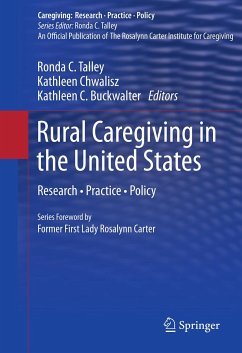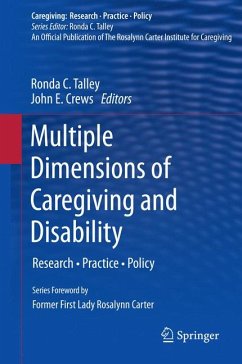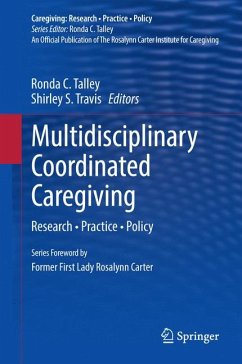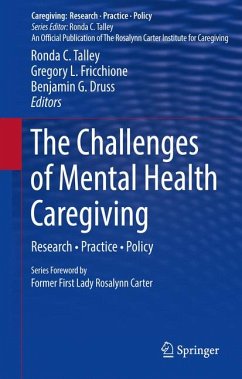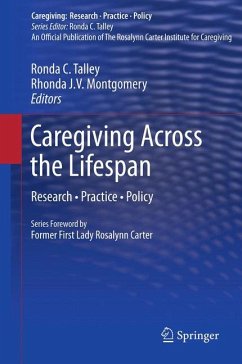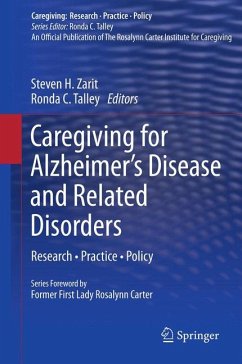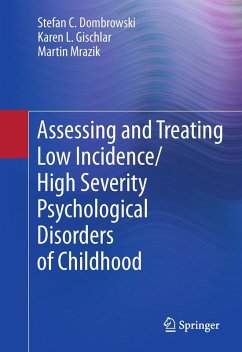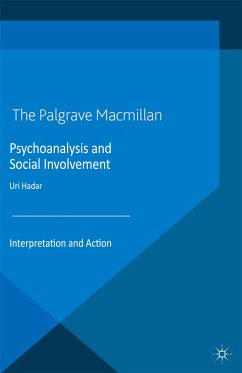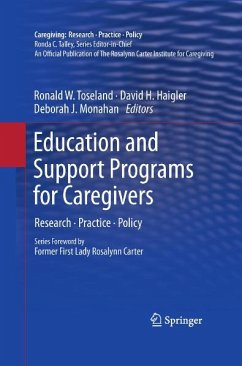
Education and Support Programs for Caregivers (eBook, PDF)
Research, Practice, Policy
Redaktion: Toseland, Ronald W.; Monahan, Deborah J.; Haigler, David H.
Versandkostenfrei!
Sofort per Download lieferbar
72,95 €
inkl. MwSt.
Weitere Ausgaben:

PAYBACK Punkte
36 °P sammeln!
For many, caring for a chronically ill family member is "the right thing to do", but it is also often a source of emotional hardship, physical stress, and social isolation. In response, skill-building, coping, and psychoeducational programs have emerged to help caregivers meet the changes and challenges in their - as well as the patients' - lives.Education and Support Programs for Caregivers reveals the diversity of the caregiver population as well as their experiences and needs, and it introduces an empirically solid framework for planning, implementing, and evaluating caregiver programs. The...
For many, caring for a chronically ill family member is "the right thing to do", but it is also often a source of emotional hardship, physical stress, and social isolation. In response, skill-building, coping, and psychoeducational programs have emerged to help caregivers meet the changes and challenges in their - as well as the patients' - lives.
Education and Support Programs for Caregivers reveals the diversity of the caregiver population as well as their experiences and needs, and it introduces an empirically solid framework for planning, implementing, and evaluating caregiver programs. The book synthesizes current trends, exploring the effectiveness of different types of programs (e.g., clinic, community, home based) and groups (e.g., peer, professional, self-help), and how supportive programs lead to improved care.
Coverage includes:
Education and Support Programs for Caregivers offers a wealth of insights and ideas for researchers, practitioners, and graduate students across the caregiving fields, including psychology, social work, public health, geriatrics and gerontology, and medicine as well as public and education policy makers.
Education and Support Programs for Caregivers reveals the diversity of the caregiver population as well as their experiences and needs, and it introduces an empirically solid framework for planning, implementing, and evaluating caregiver programs. The book synthesizes current trends, exploring the effectiveness of different types of programs (e.g., clinic, community, home based) and groups (e.g., peer, professional, self-help), and how supportive programs lead to improved care.
Coverage includes:
- Improving service delivery of education and support programs to underserved caregivers.
- Cultural, ethnic, and gender issues in conducting caregiver education and support groups.
- Utilization patterns (e.g., a key to understanding service needs).
- E-health, telehealth, and other technological developments in caregiver services.
- Evaluating the effectiveness and sustainability of programs.
- Recommendations for future practice, training, policy, and advocacy.
Education and Support Programs for Caregivers offers a wealth of insights and ideas for researchers, practitioners, and graduate students across the caregiving fields, including psychology, social work, public health, geriatrics and gerontology, and medicine as well as public and education policy makers.
Dieser Download kann aus rechtlichen Gründen nur mit Rechnungsadresse in A, B, BG, CY, CZ, D, DK, EW, E, FIN, F, GR, HR, H, IRL, I, LT, L, LR, M, NL, PL, P, R, S, SLO, SK ausgeliefert werden.



